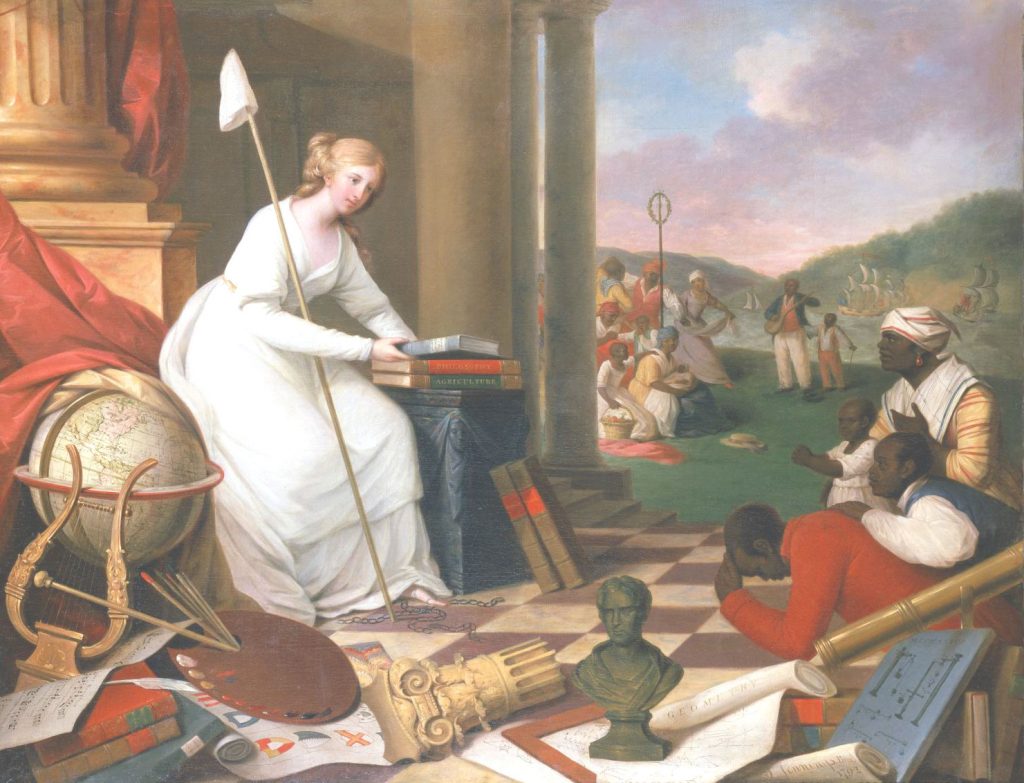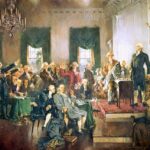One important principle that the American Founders recognized in the Declaration of Independence of 1776 when they formed the United States was the equality of man. Equality is a state of being equal or the same. Though differing in their abilities and traits, the Founders saw, men are equal in the eyes of God. The idea of man’s equality was largely influenced by the Bible and a God-oriented, Western worldview—as developed in the ancient, medieval, Reformation, modern Enlightenment, and early American periods. With this view, the Founders asserted in the Declaration, “We hold these truths to be self-evident, that all men are created equal, that they are endowed by their Creator with certain unalienable Rights, that among these are Life, Liberty and the pursuit of Happiness.” They also declared Americans’ right “to assume among the Powers of the earth, the separate and equal station to which the Laws of Nature and Nature’s God entitle them.” The Founders greatly valued the idea of man’s equality because it was the philosophical basis for man’s natural rights of life and liberty and for government by consent. Indeed, it was a guiding lamp for America’s government based on popular sovereignty or the people’s rule. To be sure, the institution and practice of slavery that existed in early America from the 1600s to 1800s did not reflect the American ideal of equality as espoused in the Declaration. Its violations of equality and rights became a moral problem that culminated in the American Civil War, as will be discussed later. The Declaration’s principle of equality, however, ultimately led to equal rights and protections for all future Americans.
The Bible and God-oriented Western thought in many ways shaped the Founders’ understanding of man’s equality by revealing that all men are equal before God in distinct ways. More specifically, the Bible reveals that man is equal in common origin, nature, dominion, moral condition, and moral responsibility. On man’s common origin, Genesis 2:7, 21-22 teaches that God created mankind from one man, the first man, Adam: “The Lord God formed a man from the dust of the ground and breathed into his nostrils the breath of life, and the man became a living being. … Then the Lord made a woman from the rib he had taken out of the man.” The disciple Luke confirms in Acts 17:26, “He [God] has made from one blood every nation of men to dwell on all the face of the earth.” On man’s common nature and dominion, Genesis 1:26-28 says that God made man, unlike other creatures, in His image, and so man has a unique dignity and dominion on earth: “‘Let us [God] make mankind in our image, in our likeness, so that they may rule…over all the creatures.’” On man’s common moral condition, Genesis 3 reveals man’s sinful state through the Fall of Adam and Eve in the Garden of Eden. The Apostle Paul in Romans 3:23 confirms man’s sinful condition, saying that “all fall short of the glory of God.” On man’s common moral responsibility, God consequently gave man a moral sense or law of good and evil as shown in Genesis 3:22: “God said, ‘The man has now become like one of us, knowing good and evil.’” In Genesis 4:7, God instructs man to “do what is right” and avoid sin or, as Psalm 34:14 says, to “turn from evil and do good.” Paul in Romans 2:14-15 confirms the moral law for mankind which is “written on their hearts.” Founding-era Americans understood from these teachings how men are equal in God’s eyes, and they drew from them to support their view that men in civil society are equal under law and in rights. Though other sources contributed to the American view of equality, this essay focuses primarily on the influence of the Bible and God-oriented Western thought on this principle.

The Ancient Israelites and Greco-Romans: Man’s Common Moral Responsibility
The ancient Israelites from 1800s-100s BC and the ancient Greco-Romans from 700s BC-400s AD laid important groundwork for the Western idea of equality among men. In particular, they believed that their people shared a common moral responsibility in being subject to moral law.
The ancient Israelites understood man’s common moral responsibility from the Hebrew Scriptures—the Old Testament of the Bible—authored between the fifteenth and first centuries BC. The Israelites believed from Genesis 3 and 4 that all men are subject to God’s moral law. They further saw from the books of Exodus and Deuteronomy that all their people were also subject to certain God-given religious, ceremonial, and civil laws. These laws applied to everyone. In Deuteronomy 1:17, the prophet Moses tells the people, “You shall not show partiality in judgment; you shall hear the small as well as the great.” With such beliefs about man’s common moral responsibility, the Israelites practiced Rule of Law in which all the people were subject to and treated equally under the same law.
The Greco-Romans understood man’s common moral responsibility apparently from nature and reason. The Greeks believed, as philosopher Aristotle expressed in his 300s BC Treatise on Rhetoric, that all men have a “universal sense of right and wrong.” The Romans likewise believed, as statesman Marcus Tullius Cicero conveyed in his c50 BC Treatise on the Laws, that all men are subject to a moral law which they called the “Law of Nature” or “right reason” and recognized as “the common property of God and man.” The c170-228 AD Roman jurist Ulpian notably stated that “as far as concerns the natural law all men are equal.” Applying this belief to civil law, the Roman’s first body of written laws for their Republic in 451 BC—the Twelve Tables—gave the same laws for all citizens regardless of class. It stated that “laws of personal exception shall not be proposed.” Ultimately, the Roman concept of equality under law, including Ulpian’s statement on natural law, reappeared in Byzantine Roman Emperor Justinian I’s 529-565 AD Corpus Juris Civilis or Body of Civil Laws which became the basis of Roman law in the Christianized Eastern Roman Empire and in medieval Western Europe.
The ancient Israelites and Greco-Romans recognized an equality among men in their common moral sense of and responsibility to a moral law—to a degree not often seen in other parts of the world at that time—based on the Bible, nature, and reason. In accordance with these views, the Greco-Romans asserted that citizens—though differing in abilities and occupations—were equal under civil law and in rights including liberty. The Greeks, as Aristotle stated in his 350 BC Politics, held that “the rights and liberties of the many, are duly respected and impartially maintained.” The Romans, as Cicero affirmed in his 54-51 BC Commonwealth, believed that though men’s fortunes and faculties are not the same, “rights at least should be equal, among those who are citizens of the same republic.” Ulpian thus stated that “by natural law all were born free.” These views and practices influenced the Western idea of man as differing in many ways but equal under law and in rights. “The most important classical element of equality,” says Scott Robinson in his 2020 essay Equality, “was its insistence that we are equal members of a community, or equally human, even if not equal in every capacity.”



